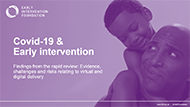EIF report
Covid-19 and early intervention: Evidence, challenges and risks relating to virtual and digital delivery
The Covid-19 pandemic has created a global public health crisis that is having and will continue to have a profound impact on every area of life. Many services for children and families will face significant disruption, as a wide range of services – such as parenting classes, home visiting programmes, youth work, counselling services and school-based services – have traditionally been delivered face-to-face.
This report sets out the evidence on virtual and digital delivery of interventions across a range of relevant domains, highlights the challenges and risks associated with remote delivery methods, and provides the findings from an EIF survey asking intervention developers and providers about their response to the Covid-19 crisis. It is intended to support the sector as it rapidly adapts to the constraints on delivery imposed by widespread social distancing and lockdown.
Examples of remotely delivered interventions include one-to-one and group-based therapy or support provided by phone, messaging or videoconferencing, through to self-guided interventions such as online quizzes, apps and games.

The report brings together what we do and do not know about the current delivery of virtual and digital services and their effectiveness; the opportunities, challenges and risks associated with remote delivery; and the emerging sector response. Our aim is to provide a high-quality and impartial view of the current evidence base to help guide those making important service decisions at this time, and to enable EIF to provide rapid advice to government and the wider community on the remote delivery of services that have traditionally relied heavily on face-to-face contact.
The research is based on a rapid review of:
- 33 UK and international evidence clearinghouses, to identify programmes for children, young people and families that have been delivered remotely
- existing evidence reviews, going back to 2000, on remote delivery of interventions for children, young people and families
- a short online survey of early intervention programme providers and developers conducted by EIF in early April, which received 88 responses.
In particular, the report focuses on the evidence as it relates to five areas of children's outcomes (outside of physical health and education, where the evidence is broader):
- mental health and wellbeing
- substance misuse
- crime, violence and antisocial behaviour, including children's behavioural problems
- risky sexual behaviour and teen pregnancy
- child maltreatment.
